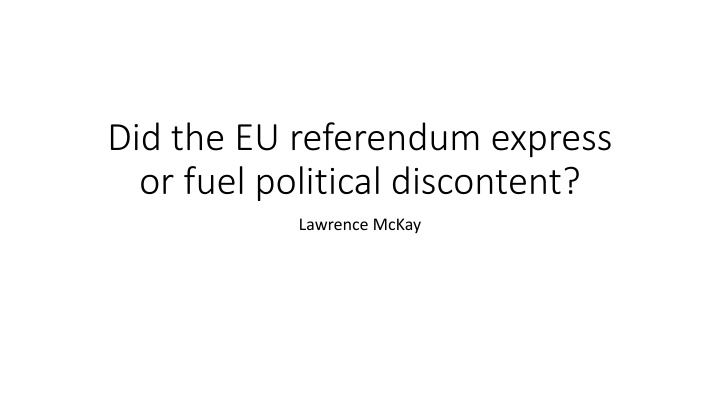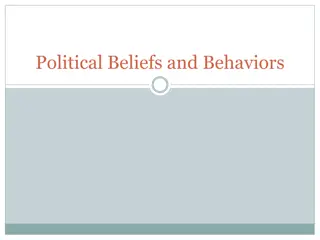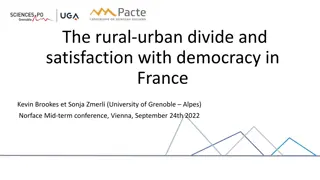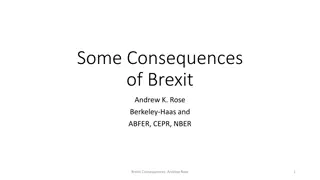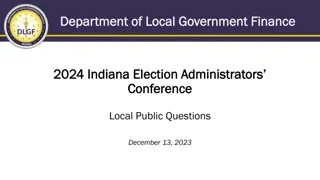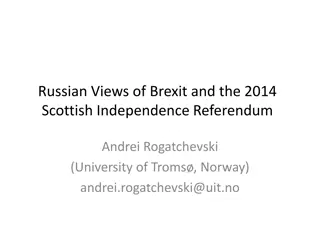Investigating Political Discontent Surrounding the EU Referendum
Analyzing the impact of political discontent on the Brexit referendum, this research delves into the relationship between public dissatisfaction with politicians and the decision to either remain or leave the EU. By examining attitudes towards politicians' concern for ordinary citizens and trust in Members of Parliament, the study aims to uncover potential correlations and shifts in sentiment before and during the referendum campaign.
Download Presentation

Please find below an Image/Link to download the presentation.
The content on the website is provided AS IS for your information and personal use only. It may not be sold, licensed, or shared on other websites without obtaining consent from the author.If you encounter any issues during the download, it is possible that the publisher has removed the file from their server.
You are allowed to download the files provided on this website for personal or commercial use, subject to the condition that they are used lawfully. All files are the property of their respective owners.
The content on the website is provided AS IS for your information and personal use only. It may not be sold, licensed, or shared on other websites without obtaining consent from the author.
E N D
Presentation Transcript
Did the EU referendum express or fuel political discontent? Lawrence McKay
Research questions Did political discontent fuel the Leave vote of last year s referendum? Inspired by the UK public debate Or did identification with the Brexit cause drive people to endorse or reject anti-politics attitudes? Inspired by American political science which emphasises how people s attitudes adapt to the messages sent out by their political party s elite
Brexit in public discourse Theresa May 2016 Conference speech: Brexit a revolution in which millions of our fellow citizens stood up and said they were not prepared to be ignored anymore Dominic Cummings (2017) blog post: There had been strong anti-Westminster feelings growing for over a decade SW1 did not appreciate the scale of this growing force even after the financial crash and expenses scandal e. g. widespread discontent is a structural condition that makes a Leave victory possible? And many, many more examples
Are the left behind the politically discontent? On the face of it, poli sci research may back up these arguments Among low education, older, and low income groups that drive Brexit, there is lower political trust and more agreement that they have no say in what government does (Dunatchik et. al., 2016) Might not only be down to demographics Controlling for demographics, evidence that disapproval of EU membership associated with more negative views of politicians across a range of attitudes (Stoker et. al. (2016)) But causal direction unclear
Initial analysis In this section I compare the people who eventually voted Remain or Leave on two fundamental attitudes related to political discontent: External efficacy i. e. politicians don t care what people like me think Trust in MPs generally I take measurements from pre-campaign, and from the height of the Referendum campaign Interpretation of process depends on whether differences exist pre- campaign, and whether they expand during the campaign
Politicians dont care what people like me think May-June 2016 (pre-ref) May 2015 (post-election)
Trust in MPs May 2015 (post-election) May-June 2016 (pre-ref)
Implications Some evidence that Remainers are more pro-politics than Leavers on the whole But campaign polarises views about politicians. Remainers express higher trust in MPs, while Leavers become more likely to take the view that politicians don t care what they think. Why? One obvious explanation springs to mind: the Leave side s heavy use of anti-establishment rhetoric Nonetheless findings that Leavers express more political discontent than Remainers implies it s possible that this influenced their votes
Did discontent help Leave? Three theories Discontent is not monolithic + attitudes can be separated both conceptually and empirically Dissatisfied democrats - unhappy with UK democracy and vote Leave to shake up the system Political fatalism party politics doesn t really change things, so a more fundamental systemic change is needed (such as leaving EU) Anti-politics more focus on political actors as untrustworthy, uncaring, out for themselves, etc. Vote Leave to kick back at politicians ignoring people like them/their communities
Hypotheses Based on theory of dissatisfied democrats : H1: The lower an individual s satisfaction with UK democracy, the more likely they are to vote Leave. Based on theory of political fatalism : H2: The more an individual agrees with the idea that it doesn t matter who is in power, the more likely they are to vote Leave. Based on theory of anti-politics : H3: The loweran individual s level of external political efficacy is, the more likely they are to vote Leave. H4: The lower an individual s trust in MPs is, the more likely they are to vote Leave
Model specification deciding controls Considered 4 early studies of Brexit Clarke/Goodwin, Goodwin/Milazzo, Kaufmann, Sobolewska All of them model: Demographics and party identification National identities and views on immigration But differ on whether to include: Economic views, authoritarian values, Brexit risks/benefits, Europe/integration attitudes Because of lack of real precedent in research we have to go by logic Point is to know whether people wanted to make expressive anti- system/anti-politics vote, whatever they thought of the instrumental costs/benefits of Remaining or Leaving.
My approach I identify five sets of predictors 1. The independent variables 2. Demographic controls (age, gender, education) 3. EU/leaving EU costs and benefits (effects of leaving EU on: immigration, terrorism, Britain s global influence, the economy, the NHS; plus whether R agreed EU had prevented war and made Britain more prosperous) 4. Immigration views (good or bad for economy, enriches or undermines cultural life, whether you would allow more/fewer immigrants) 5. English/British/European identities + perceived effect of EU on national identity
My approach (cont.) Independent variables taken from W7 as well as W8 due to low n on some IVs from W8. n = 11,781. All models use binary logit regression predicting a Leave vote against the base category, a Remain vote. Decided to drop non-voters: turnout is a different question.
Model results No effect of satisfaction with UK democracy. No effect of external efficacy ( politicians don t care ) No effect of trust in MPs. No effect of it doesn t matter which party is in power . Results insensitive to how it was modelled, what was controlled for None of the hypotheses connecting political discontent with the vote to Leave were supported.
What actually mattered? A mixed bag of factors were found to drive vote- choice Supporting Clarke/Goodwin statement that the narrow Brexit decision reflected a complex and cross-cutting mix of calculations, emotions and cues Leaving improves economy EU makes UK more prosperous Economic EU undermines national identity European-ness Identity Leaving enhances influence Leaving good for NHS EU prevents war Other
Conclusion Brexit voters were more politically discontented both on and prior to 23 June idea that it was a cause not implausible. But ultimately levels of discontent do not appear to have moved votes. The relationship between discontent and voting may be in the opposite direction: Brexit fuelling rather than expressing political discontent. But fuelling not quite right either on some measures (e. g. trust) the referendum is associated with a polarisation between Remain/Leavers. Possible that it could have mattered indirectly. But we don t yet have much evidence of a direct link and could do more to confront this simplistic political narrative. Useful for populists but less so for understanding Brexit.
